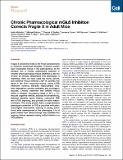Chronic Pharmacological mGlu5 Inhibition Corrects Fragile X in Adult Mice
Author(s)
Michalon, Aubin; Sidorov, Michael; Ballard, Theresa M.; Ozmen, Laurence; Spooren, Will; Wettstein, Joseph G.; Jaeschke, Georg; Bear, Mark; Lindemann, Lothar; ... Show more Show less
DownloadMichalon-2012-Chronic Pharmacologi.pdf (904.9Kb)
PUBLISHER_POLICY
Publisher Policy
Article is made available in accordance with the publisher's policy and may be subject to US copyright law. Please refer to the publisher's site for terms of use.
Terms of use
Metadata
Show full item recordAbstract
Fragile X syndrome (FXS) is the most common form of inherited intellectual disability. Previous studies have implicated mGlu5 in the pathogenesis of the disease, but a crucial unanswered question is whether pharmacological mGlu5 inhibition is able to reverse an already established FXS phenotype in mammals. Here we have used the novel, potent, and selective mGlu5 inhibitor CTEP to address this issue in the Fmr1 knockout mouse. Acute CTEP treatment corrects elevated hippocampal long-term depression, protein synthesis, and audiogenic seizures. Chronic treatment that inhibits mGlu5 within a receptor occupancy range of 81% ± 4% rescues cognitive deficits, auditory hypersensitivity, aberrant dendritic spine density, overactive ERK and mTOR signaling, and partially corrects macroorchidism. This study shows that a comprehensive phenotype correction in FXS is possible with pharmacological intervention starting in young adulthood, after development of the phenotype. It is of great interest how these findings may translate into ongoing clinical research testing mGlu5 inhibitors in FXS patients.
Date issued
2012-04Department
Massachusetts Institute of Technology. Department of Brain and Cognitive Sciences; Picower Institute for Learning and MemoryJournal
Neuron
Publisher
Elsevier B.V.
Citation
Michalon, Aubin, Michael Sidorov, Theresa M. Ballard, Laurence Ozmen, Will Spooren, Joseph G. Wettstein, Georg Jaeschke, Mark F. Bear, and Lothar Lindemann. “Chronic Pharmacological mGlu5 Inhibition Corrects Fragile X in Adult Mice.” Neuron 74, no. 1 (April 2012): 49–56. © 2012 Elsevier Inc.
Version: Final published version
ISSN
08966273